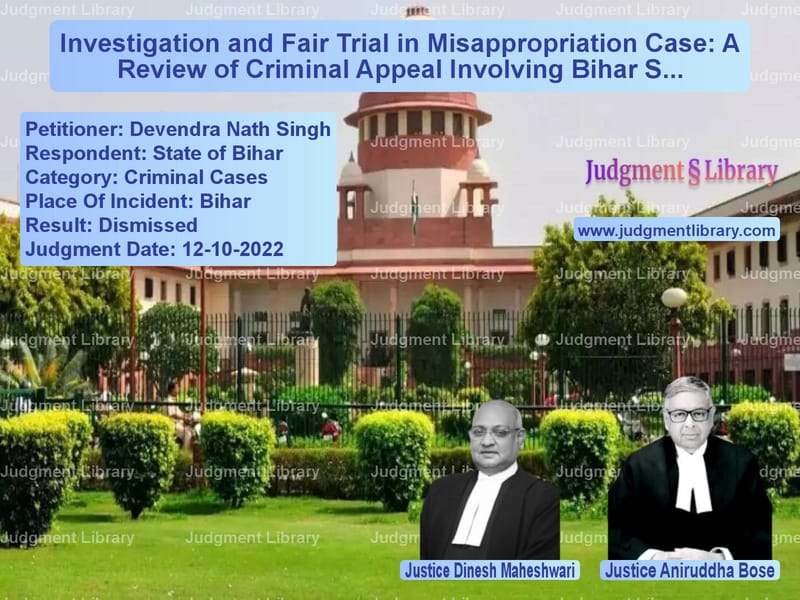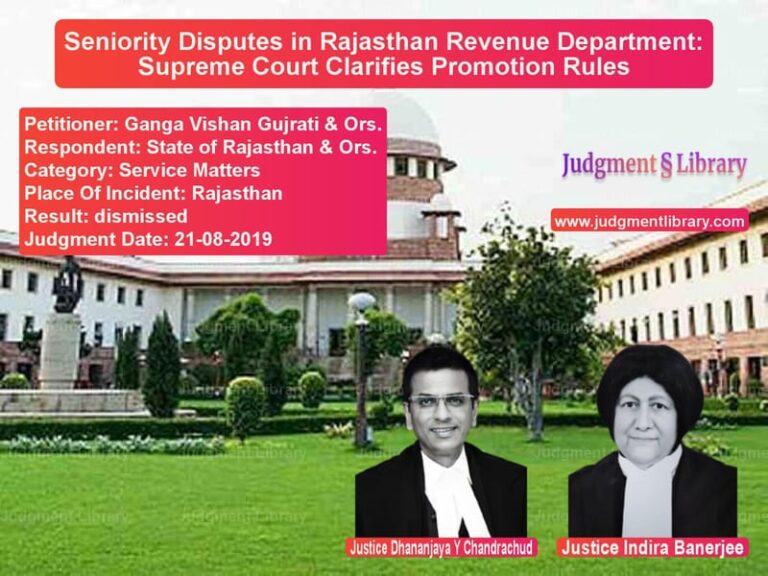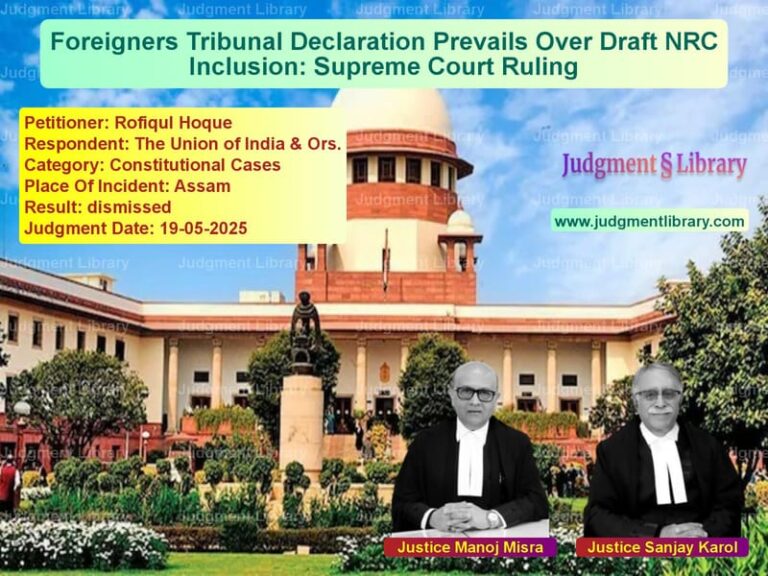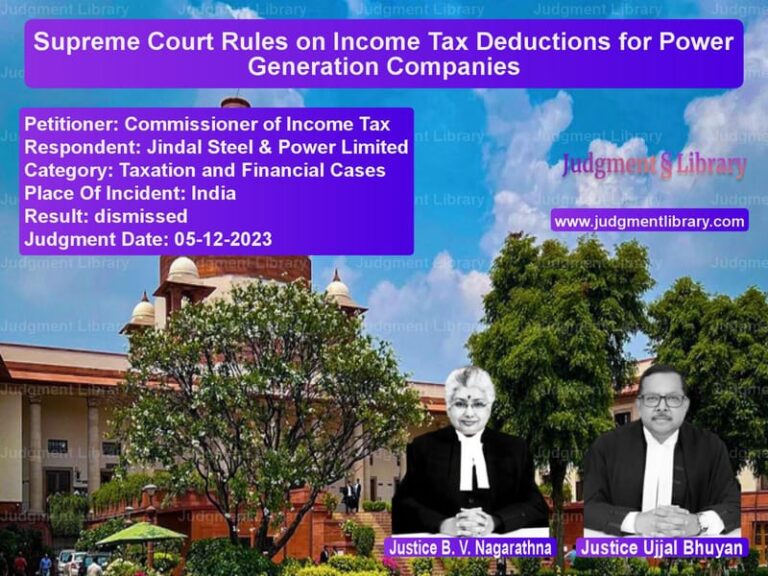Investigation and Fair Trial in Misappropriation Case: A Review of Criminal Appeal Involving Bihar State Food Corporation
This case involves the appeal of Devendra Nath Singh against the order passed by the High Court of Patna, which directed further investigation into allegations of misappropriation of food stocks from the Bihar State Food and Civil Supplies Corporation (BSFCSC). The case revolves around the role of the District Manager, Mr. Singh, and the appointment of a Class IV employee, respondent No. 3, as the in-charge of the godown where the alleged misappropriation occurred. The High Court had questioned why the District Manager was not investigated despite his significant role, and directed further investigation under Section 173(8) of the CrPC. The Supreme Court examined whether the High Court had overstepped its bounds by directing further investigation and whether the appellant’s right to a fair trial had been compromised by the High Court’s failure to provide a hearing before passing the order.
Background of the Case
The misappropriation of food grains worth approximately Rs. 16,99,648 from the godown of the Bihar State Food and Civil Supplies Corporation occurred during the years 2010-11 and 2011-12. An FIR was filed, and charges under Sections 409 (Criminal breach of trust), 467 (Forgery of documents), 468 (Forgery for purpose of cheating), and 420 (Cheating) of the Indian Penal Code (IPC) were brought against the Class IV employee, respondent No. 3. However, it was argued that the District Manager, Devendra Nath Singh, who was ultimately responsible for the godown and the distribution of food grains, had been exonerated in the internal inquiry and was not named in the FIR or charge sheet. The petitioners in this case, especially respondent No. 3, claimed that they were scapegoated to protect the District Manager.
Petitioner Arguments
The appellant, Devendra Nath Singh, challenged the order of the High Court, which had directed further investigation regarding his role in the alleged misappropriation. The appellant contended that the High Court had no jurisdiction to issue such directions, as the police had already conducted an investigation, and the charge sheet had been filed based on the material available. Moreover, the appellant argued that the investigation was the prerogative of the investigating agency, and the High Court could not usurp the powers vested in the police under the Code of Criminal Procedure (CrPC).
The appellant further argued that the High Court had violated the principles of natural justice by passing an order without providing an opportunity to be heard. As the appellant was not a party to the High Court proceedings, he was not given a chance to defend himself or contest the allegations during the High Court’s review.
The appellant’s counsel referred to the case of Popular Muthiah v. State (2006), where the Supreme Court held that the High Court could not direct a fresh investigation in cases where the investigation had already been completed, especially if the accused had not been named in the FIR or charge sheet. The appellant argued that the High Court’s direction for further investigation violated the established principle that a court cannot order a specific manner of investigation or prosecution of a person.
Respondent Arguments
The respondent, representing the complainant, argued that the High Court’s direction for further investigation was justified. The respondent highlighted the fact that Devendra Nath Singh, as the District Manager, had clear responsibility for the misappropriation of food stocks. The respondent contended that Singh had been given a clean chit in the initial inquiry, but it was evident from the audit report that Singh’s role in the misappropriation could not be ignored.
The respondent’s counsel pointed out that the misappropriation was of public property and involved food meant for the economically weaker sections of society. As such, the case was of great public importance, and the High Court exercised its powers under Section 482 of the CrPC to ensure that all involved parties were investigated fairly. The counsel argued that the High Court had the authority to direct further investigation if it felt that the investigation had not been conducted impartially and had failed to account for all parties responsible.
Supreme Court’s Judgment
The Supreme Court, after considering the arguments from both sides, upheld the High Court’s direction for further investigation but expressed concerns over the High Court’s remarks regarding the appellant’s involvement. The Court ruled that the High Court had rightly exercised its inherent powers under Section 482 CrPC to order further investigation, as it was satisfied that the investigation had not been conducted thoroughly, particularly regarding the role of the appellant. The Court noted that when a high-ranking officer like the District Manager is allegedly involved in a misappropriation, it is crucial that the investigation is conducted impartially and comprehensively.
However, the Supreme Court also criticized the High Court for making prejudicial remarks about the appellant. The Court observed that such statements, like describing the appellant as responsible for the irregularities and implying that the respondent was a scapegoat, could influence the ongoing investigation and trial. The Court emphasized that while the High Court had the power to direct further investigation, it should have refrained from making comments that could undermine the presumption of innocence and fairness in the trial process.
The Court also addressed the issue of the appellant’s right to a hearing before the High Court issued its directions. The Court held that although the High Court could exercise its powers under Section 482 CrPC without providing an opportunity for a hearing at the investigation stage, it should have taken the appellant’s exoneration in departmental proceedings into account. The Court noted that the appellant had been cleared in an internal departmental inquiry, which was a relevant fact that should have been considered by the High Court.
Key Points of the Judgment
- The Supreme Court upheld the High Court’s direction for further investigation into the role of the appellant in the misappropriation case.
- The Court emphasized the importance of a fair investigation and the High Court’s power to direct further investigation in cases where it is necessary to secure justice.
- The Court criticized the High Court for making prejudicial comments about the appellant, as this could affect the fairness of the ongoing investigation.
- The Court ruled that the appellant’s exoneration in departmental proceedings was an important factor that should have been considered by the High Court.
- The Supreme Court concluded that the High Court’s order for further investigation was justified but ordered that the High Court’s remarks be effaced to prevent prejudice to the appellant.
Conclusion
The Supreme Court’s judgment in this case reaffirms the importance of conducting a fair and impartial investigation, especially in cases involving public funds and responsibilities. While the High Court’s direction for further investigation was upheld, the Court cautioned against making prejudicial remarks that could undermine the fairness of the investigation and trial. The judgment highlights the need for courts to exercise their inherent powers with caution and ensure that the rights of the accused are protected throughout the legal process.
Petitioner Name: Devendra Nath Singh.Respondent Name: State of Bihar.Judgment By: Justice Dinesh Maheshwari, Justice Aniruddha Bose.Place Of Incident: Bihar.Judgment Date: 12-10-2022.
Don’t miss out on the full details! Download the complete judgment in PDF format below and gain valuable insights instantly!
Download Judgment: devendra-nath-singh-vs-state-of-bihar-supreme-court-of-india-judgment-dated-12-10-2022.pdf
Directly Download Judgment: Directly download this Judgment
See all petitions in Bail and Anticipatory Bail
See all petitions in Fraud and Forgery
See all petitions in Custodial Deaths and Police Misconduct
See all petitions in Theft and Robbery Cases
See all petitions in Money Laundering Cases
See all petitions in Judgment by Dinesh Maheshwari
See all petitions in Judgment by Aniruddha Bose
See all petitions in dismissed
See all petitions in supreme court of India judgments October 2022
See all petitions in 2022 judgments
See all posts in Criminal Cases Category
See all allowed petitions in Criminal Cases Category
See all Dismissed petitions in Criminal Cases Category
See all partially allowed petitions in Criminal Cases Category







